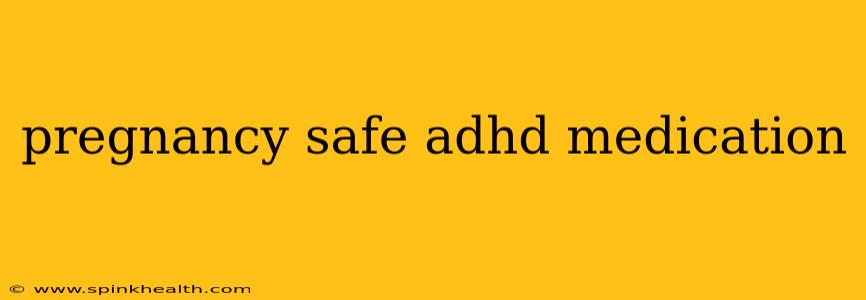Navigating ADHD Medication During Pregnancy: A Journey of Choices and Considerations
The news is exhilarating: you're pregnant! But if you also manage ADHD, a wave of new concerns might wash over you. The question of ADHD medication during pregnancy is a complex one, fraught with anxieties and the need for careful consideration. This isn't a simple "yes" or "no" answer; it's a journey of informed choices made in close collaboration with your healthcare providers.
My name is Sarah, and I'm a registered nurse specializing in women's health, having supported countless women through this very situation. I understand the overwhelming feelings that arise when balancing the needs of your developing child with your own health and well-being. Let's explore this crucial topic together.
What are the risks associated with untreated ADHD during pregnancy?
This is a pivotal question, as the risks of not managing your ADHD during pregnancy are often overlooked. Uncontrolled ADHD symptoms can lead to:
- Increased stress and anxiety: The hormonal changes and demands of pregnancy can exacerbate existing ADHD symptoms, leading to significant stress and anxiety, impacting both your physical and mental health. This stress can negatively affect fetal development.
- Difficulty managing daily tasks and routines: Pregnancy requires careful attention to diet, rest, and appointments. Untreated ADHD can make adhering to these crucial routines incredibly challenging.
- Sleep disturbances: Sleep deprivation is common with ADHD, and pregnancy fatigue only intensifies this. Consistent lack of sleep can have significant consequences for both mother and baby.
- Challenges in adhering to prenatal care: Keeping appointments, understanding medical instructions, and effectively communicating with healthcare providers become significantly more difficult with unmanaged ADHD.
Ignoring these risks can jeopardize your overall health and the well-being of your pregnancy.
What medications are considered safe during pregnancy for ADHD?
This is where professional guidance is absolutely paramount. There is no one-size-fits-all answer. While some studies suggest a lower risk associated with certain medications, each pregnancy is unique, and individual factors must be considered. The decision on whether to continue or discontinue medication, and which medication to use, should be made in consultation with your psychiatrist, obstetrician, and possibly a high-risk pregnancy specialist.
Generally, the conversation often centers around carefully weighing the risks and benefits of medication versus the risks associated with untreated ADHD. This is a nuanced discussion, and self-medicating or making this decision alone is extremely dangerous.
What are the potential risks of taking ADHD medication during pregnancy?
While some medications may be considered safer than others, there are still potential risks associated with taking any medication during pregnancy. These risks can vary depending on the specific medication, dosage, and the individual's health. Your healthcare team will thoroughly assess these risks with you, explaining potential effects on the fetus and how they'll be monitored. It’s crucial to have open communication with them throughout the process.
Are there alternative treatments for ADHD during pregnancy besides medication?
Absolutely! Your healthcare providers might suggest non-pharmacological approaches in conjunction with or as an alternative to medication. These could include:
- Therapy: Cognitive Behavioral Therapy (CBT) and other therapeutic approaches can be incredibly effective in managing ADHD symptoms.
- Lifestyle changes: This can include improving sleep hygiene, implementing organizational strategies, and practicing stress-reduction techniques like mindfulness or yoga.
- Nutritional adjustments: A balanced diet can play a significant role in improving energy levels and focus.
When should I talk to my doctor about ADHD medication and pregnancy?
The ideal time to have this conversation is before you conceive, if possible. This allows for proactive planning and collaborative decision-making. However, if you're already pregnant and taking ADHD medication, contacting your healthcare provider immediately is crucial. Delaying this crucial conversation can negatively impact both you and your baby.
This information is for educational purposes only and should not be considered medical advice. Your health and the well-being of your baby are paramount. Always consult with your healthcare team to create a personalized plan that addresses your unique needs and circumstances. Remember, you're not alone in this journey. Seeking professional support and open communication are key to navigating ADHD and pregnancy successfully.

